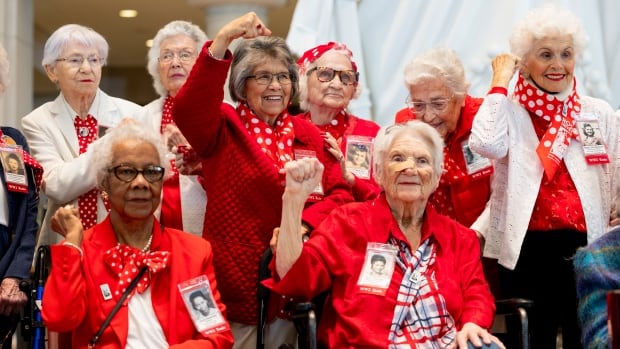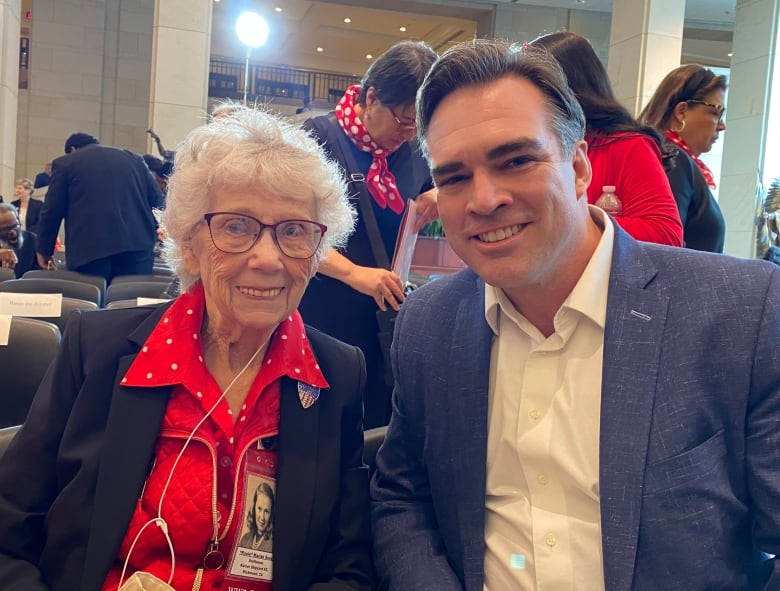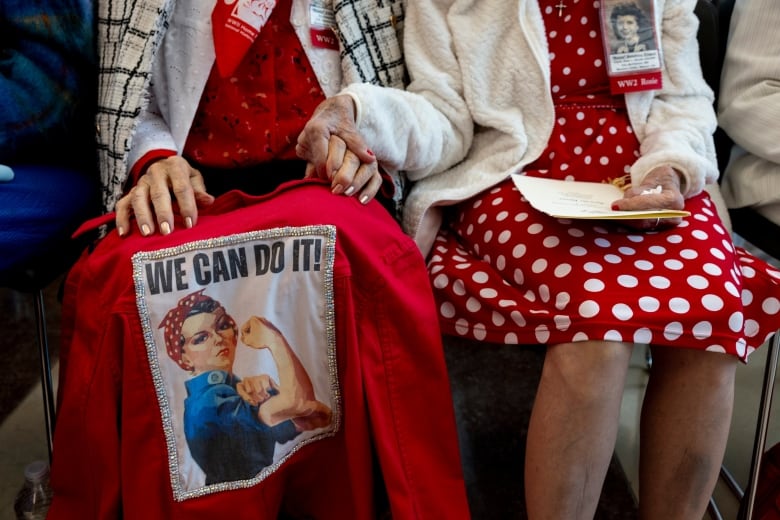
As It Happens5:59Real-life ‘Rosie the Riveters’ recieve top U.S. civilian honour
When Marian Sousa got her first job at the age of 17, not only did she earn some extra cash — she helped change the course of history.
Sousa, 98, is one of more than six million U.S. women who broke traditional gender roles and joined the workforce during the Second World War.
On Wednesday, she was one of 27 of surviving “Rosie the Riveters” — so-called because of the famous recruitment posters of the era — who gathered in the U.S. Capitol to receive a Congressional Gold Medal of Honor, the nation’s top civilian award.
“I’m still searching for the perfect word. It’s just so amazing and I’m just so elated that they have finally recognized us, these courageous women that stepped forward,” Sousa told As It Happens host Nil Köksal.
‘Double victory’
After Japan bombed the Pearl Harbour naval base in Honolulu in 1941, drawing the U.S. into the war, men of working age were quickly drafted into the military, leaving huge job vacancies at home.
The Rosies, as they’re known, stepped in and filled those roles, many at factories and shipyards that directly contributed to the war effort.
It was unprecedented at a time in American history when it was widely believed that a woman’s place was exclusively in the home.
While many women returned to more traditional roles after the war, their efforts are widely considered a pivotal moment in the U.S. women’s rights movement.

“They all sacrificed time away from home and they used their God-given talents for the good of our nation, and for military victory against the Axis powers,” Mike Johnson, speaker for the U.S. House of Representatives, said at the medal ceremony.
“These women fought for double victory, really, when you think about it. It was a victory from tyranny, but it was also a victory from prejudice. Because although they were now welcome at our voting booths, they were not yet welcome on the usual assembly lines. That all changed because of these Rosies.”
Sousa started her job not long after graduating high school. Her art teacher recommended her for a six-week training program in engineering drawing at the University of California, Berkeley.
From there, she was hired straightaway to work at Shipyard No. 3 in Richmond, Calif., drafting and revising blueprints for troop transport ships.
“This was my first job. So, you know, I was excited,” she said. “That patriotic feeling [is something] I got from my dad, who was in the army.”

The other women in her family joined the workforce too. Her sisters both became welders, and her mother worked as a spray painter.
“We all wanted to help,” Sousa said.
She remembers the day she got to watch a ship, one of the products of her labour, launch from a basin at the shipyard.
“We all yelled ‘Hooray!’ and then we went back to work. I mean, people were working every minute,” she said.
The men she worked alongside were welcoming, she said. “They were really kind. They never looked down on us.”
Sousa had been recently married when she started working. A year into her job, she was expecting her first baby. The master draughtsman in the shipyard, she says, threw her a surprise baby shower at work.
She left the workforce to raise her family. Asked if she missed it, Sousa said: “Oh, yes, I did. I certainly missed the pay.”
‘It was a man’s world’
Wednesday’s ceremony was, in large part, thanks to the efforts of Sousa’s late sister Phyllis Gould who, according to the Rosie the Riveter Trust, lobbied for the honour for years alongside Mae Krier.
Krier, 98, worked for Boeing in Seattle during the war and accepted the medal on behalf of all her fellow Rosies, past and present.
“We helped our country win the war. We also helped save the world and I think that’s outstanding,” Krier told the crowd, which included dozens of white-haired women decked out in red polka dots and kerchiefs, reminiscent of the iconic poster.
“Up until 1941, it was a man’s world. They didn’t know how capable us women were, did they?”
Their work, she said, left “footprints in the sand” for future generations of women to follow. “We’re so proud of the women and young girls who are following in our lead,” Krier said.
It’s something Sousa has seen first-hand. Her granddaughters all work today, she said.
Before leaving San Francisco, Sousa says women mechanics, machinists and flight attendants for airline United donned Rosie-inspired outfits.
She’s also had the opportunity to meet women who work on U.S. naval bases.
“If I did anything to help, I’m glad. I’m proud,” she said, before adding: “But, you know, we still don’t have equal pay.”